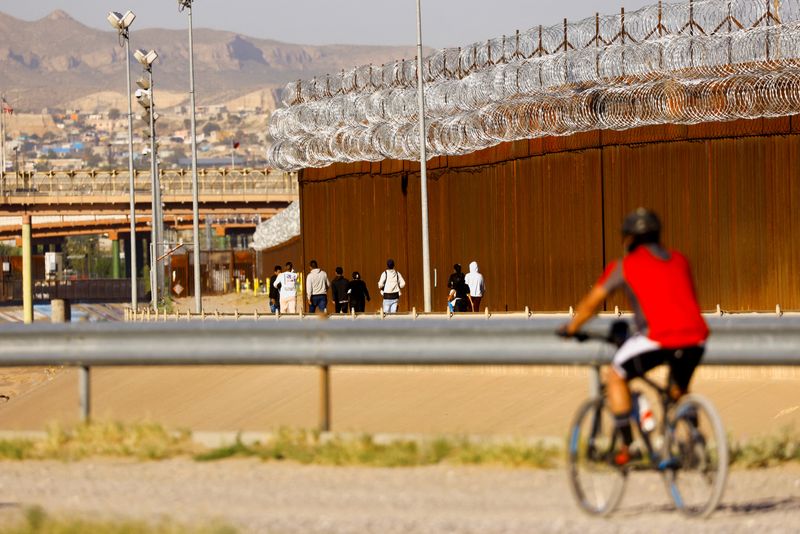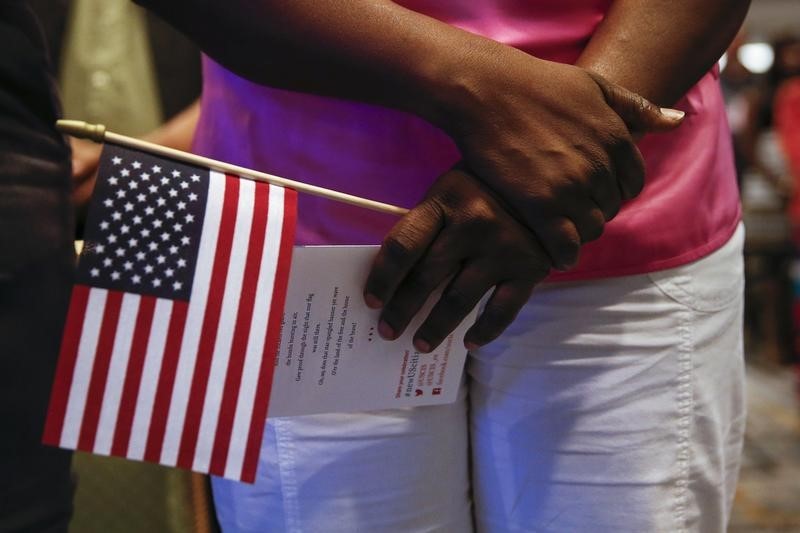By Ted Hesson and Mica Rosenberg
The United States announced on Thursday it will extend COVID-19 pandemic-era restrictions nL1N33Q1F2, known as Title 42, to expel migrants from Nicaragua, Cuba and Haiti caught crossing the U.S.-Mexico border back to Mexico, a move would block more nationalities from seeking asylum in the United States.
At the same time, the White House said it would open more legal pathways for migrants from those nations to apply to enter the country from abroad.
WHY ARE MIGRANTS BLOCKED AT THE BORDER UNDER COVID RULES?
At the start of the COVID-19 pandemic in March 2020, U.S. health authorities issued Title 42 to allow border agents to rapidly send migrants crossing the U.S.-Mexico border back to Mexico or other countries.
The order was implemented under Republican former President Donald Trump, whose administration sought to greatly curtail both immigration. The U.S. Centers for Disease Control and Prevention (CDC) said at the time it was needed to stem the spread of COVID-19 in crowded detention settings.
Some public health experts, Democrats and advocates have criticized and pushed back against the order, saying it unlawfully blocked migrants from claiming asylum and subjected them to dangers, like kidnapping and assault, in Mexico. Migrants and immigrant advocate organizations sued seeking to lift the order, while Republican states have sued to keep it in place, litigation that is still ongoing.
HOW DID BIDEN HANDLE TITLE 42?
U.S. President Joe Biden, a Democrat who took office in January 2021, campaigned on a promise to reverse Trump's restrictive asylum policies.
While Biden moved to end some Trump restrictions, he left Title 42 in place for more than a year, exempting unaccompanied children but allowing U.S. authorities to send hundreds of thousands of migrants, including families, back to Mexico.
Since Biden took office, there have been record numbers of migrants caught crossing the U.S.-Mexico border, causing operational and political challenges for his administration. Many have repeatedly crossed after being expelled under Title 42 to nearby Mexican border cities.
Mexico, however, had initially only accepted the return of some nationalities, including its own citizens and migrants from Guatemala, Honduras and El Salvador. In October, the expulsions were expanded to Venezuelans. Other nationalities have generally been let into the United States to pursue their immigration cases, straining some border cities where many migrants have recently arrived like El Paso, Texas.
WHY DID THE SUPREME COURT RULE ON TITLE 42?
The CDC announced in April 2022 that it would end Title 42, saying it was no longer needed to limit the spread of COVID-19 in light of vaccines and other medical advances.
But a federal judge in Louisiana blocked the termination after a legal challenge brought by a group of two dozen U.S. states with Republican attorneys general who argued that increased migration would saddle their states with costs.
In a separate lawsuit, brought by the American Civil Liberties Union (ACLU) and other groups on behalf of migrant families who argue they were harmed by Title 42, a Washington, D.C.-based judge struck down Title 42 on Nov. 15.
The judge, U.S. District Judge Emmet Sullivan, ruled Title 42 violated federal regulatory law but delayed the effective date of his decision until Dec. 21 to give authorities time to prepare.
Following the ruling, a coalition of U.S. states with Republican attorneys general sought to intervene in the lawsuit to keep Title 42 in place, making their case at the U.S. Supreme Court.
In arguments similar to those made in the Louisiana case, the states said that ending Title 42 would "cause an enormous disaster at the border" and leave them shouldering the cost of services for new arrivals.
The conservative-leaning Supreme Court ruled in that the policy should stay in place as they consider the case.
WHY IS BIDEN EXPANDING TITLE 42?
After the Supreme Court ruling, the Biden administration said it would start expelling Cubans, Nicaraguans and Haitians back to Mexico under Title 42, migrants who previously had been allowed into the United States to pursue their immigration cases.
The move builds on a policy launched in October that began expelling Venezuelans but at the same time allowed thousands of migrants from that country to enter by air if they applied from abroad and could demonstrate they had a U.S. sponsor under a new "humanitarian parole" program.
Biden's plan would open that program to the additional nationalities and in total accept up to 30,000 migrants per month from the four countries combined. Those who have a U.S. sponsor and meet certain requirements can apply to enter the country legally by air.
Previously, human rights groups and immigrant advocates have criticized expanding the nationalities that can be expelled under Title 42, which they say no longer has a basis in public health and continues to limit asylum access.
HOW DOES THE PAROLE PROGRAM WORK, WHY THESE NATIONALITIES?
The humanitarian entry for Venezuelans, and now Cubans, Nicaraguans and Haitians, will operate similarly to one created following Russia's Feb. 24 invasion of Ukraine that allows Ukrainians with U.S. sponsors to enter and temporarily stay in the United States by applying from outside the country.
Tense diplomatic relations between the United States and the governments of Cuba, Nicaragua and Venezuela have complicated deportations to those countries.

Deportation, under a statute known as Title 8, is a more formal and drawn out process that can lead to long bars on U.S. re-entry as compared to expulsions that can take just hours under Title 42 and leave no deportation record.
Haiti has accepted deportees and migrants expelled under Title 42, but U.S. lawmakers and advocates have criticized the Biden administration for returning people to a country beset by political violence and instability.
